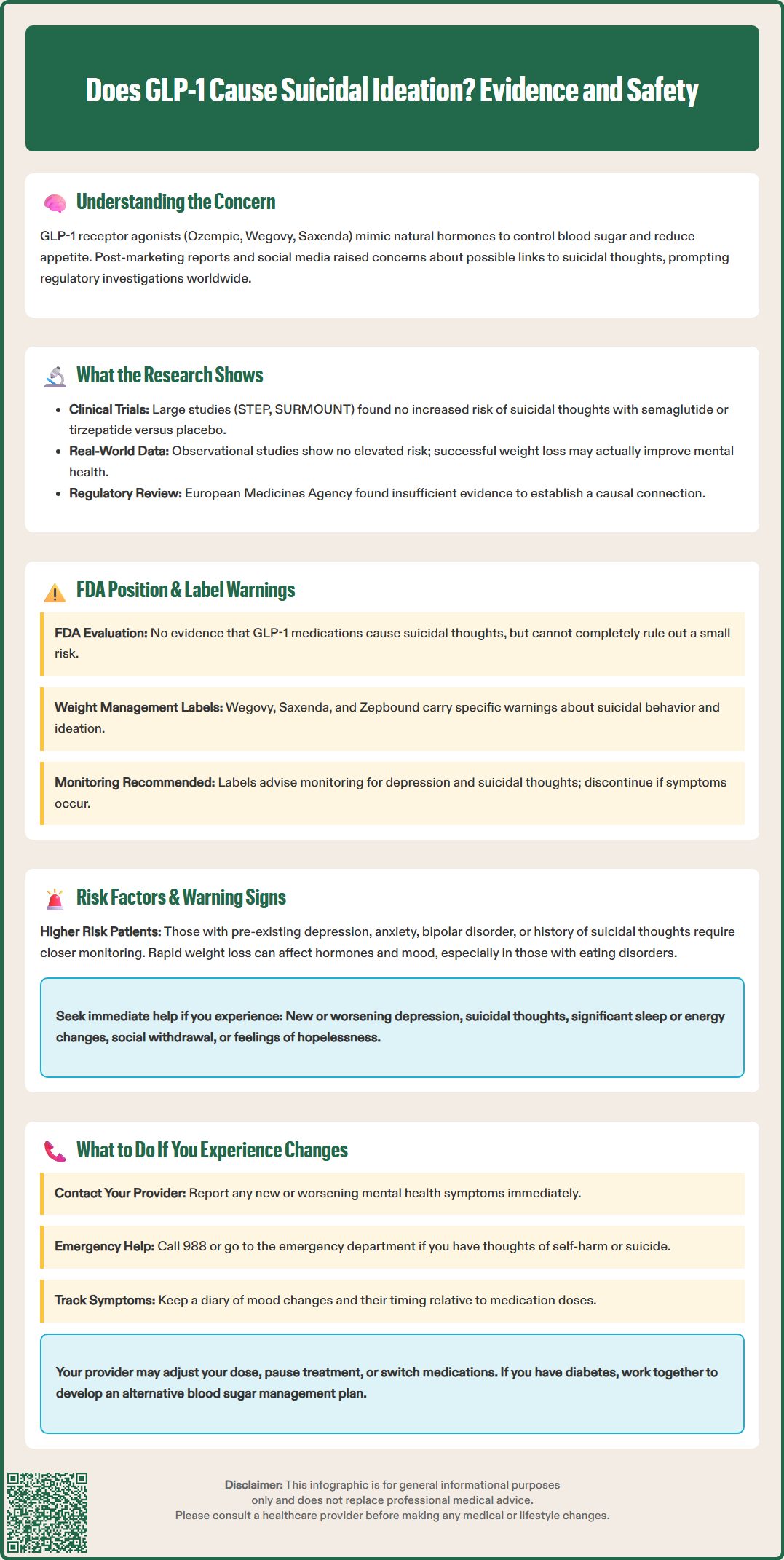LOSE WEIGHT WITH MEDICAL SUPPORT — BUILT FOR MEN
- Your personalised programme is built around medical care, not willpower.
- No generic diets. No guesswork.
- Just science-backed results and expert support.
Find out if you’re eligible

Concerns about suicidal ideation associated with GLP-1 receptor agonists have emerged from post-marketing reports, prompting regulatory investigation. Current evidence from large clinical trials and observational studies does not establish a causal link between these diabetes and weight management medications and suicidal thoughts. The FDA's preliminary evaluation found no evidence that GLP-1 medications cause suicidal ideation, though monitoring continues. Understanding the distinction between correlation and causation is essential, as many patients using these medications may have pre-existing mental health conditions. This article examines the current evidence, regulatory guidance, and appropriate monitoring strategies for patients and clinicians.
Quick Answer: Current evidence does not establish that GLP-1 receptor agonists cause suicidal ideation, according to FDA preliminary evaluation and large clinical trials.
We offer compounded medications and Zepbound®. Compounded medications are prepared by licensed pharmacies and are not FDA-approved. References to Wegovy®, Ozempic®, Rybelsus®, Mounjaro®, or Saxenda®, or other GLP-1 brands, are informational only. Compounded and FDA-approved medications are not interchangeable.
Glucagon-like peptide-1 (GLP-1) receptor agonists represent a class of medications originally developed for type 2 diabetes management, with some now FDA-approved for weight management. These medications include semaglutide (Ozempic for diabetes, Wegovy for weight management), liraglutide (Victoza for diabetes, Saxenda for weight management), and dulaglutide (Trulicity for diabetes only). Tirzepatide (Mounjaro for diabetes, Zepbound for weight management) is a dual glucose-dependent insulinotropic polypeptide (GIP) and GLP-1 receptor agonist, not a pure GLP-1 medication.
These medications work by mimicking naturally occurring incretin hormones. They enhance insulin secretion in response to meals, suppress glucagon release, slow gastric emptying, and reduce appetite through central nervous system pathways. Their mechanism involves binding to receptors located throughout the body, including in the pancreas, gastrointestinal tract, and brain regions involved in appetite regulation.
Concerns about suicidal ideation and other mental health effects emerged following post-marketing surveillance reports and patient anecdotes shared on social media platforms. These reports prompted regulatory agencies in multiple countries to investigate whether a causal relationship exists between these medications and suicidal thoughts or behaviors. The question has significant clinical importance given the widespread use of these medications and the serious nature of suicidal ideation.
It is important to distinguish between correlation and causation when evaluating these concerns. Many individuals seeking weight loss treatment may have pre-existing mental health conditions, including depression and anxiety, which are themselves associated with obesity. Understanding the current evidence helps clinicians and patients make informed treatment decisions while maintaining appropriate vigilance for mental health changes during therapy.
All GLP-1 receptor agonists and tirzepatide carry a boxed warning about thyroid C-cell tumors seen in rodent studies and are contraindicated in patients with a personal or family history of medullary thyroid carcinoma (MTC) or Multiple Endocrine Neoplasia syndrome type 2 (MEN2).
The scientific evidence examining the relationship between GLP-1 receptor agonists and suicidal ideation remains limited but largely reassuring. Large-scale clinical trials conducted prior to medication approval did not identify a significant signal for increased suicidal thoughts or behaviors. The pivotal STEP trials for semaglutide and SURMOUNT trials for tirzepatide included thousands of participants with monitoring for suicidal ideation using standardized tools such as the Columbia-Suicide Severity Rating Scale (C-SSRS), and did not demonstrate elevated rates compared to placebo groups.
Observational studies using real-world data have examined this relationship in diverse patient populations. These analyses have generally not found evidence of increased suicidal ideation or self-harm associated with GLP-1 medications compared to other treatments. Some studies suggest that successful weight loss may improve mental health outcomes in many patients, potentially offsetting any direct medication effects.
However, post-marketing surveillance has identified isolated case reports of suicidal ideation temporally associated with these medications. The European Medicines Agency (EMA) has reviewed reports of suicidal or self-injurious thoughts among GLP-1 users worldwide. While these reports warrant attention, the absolute number remains small relative to the total number of patients treated, and causality has not been established.
Researchers have proposed several hypothetical mechanisms for reported cases, including rapid weight loss effects on mood, neurochemical changes, or unmasking of pre-existing psychiatric conditions. These hypotheses remain speculative and require further investigation. The current evidence does not support a definitive causal link between these medications and suicidal ideation, though ongoing pharmacovigilance continues to monitor for potential signals.

The US Food and Drug Administration (FDA) has actively monitored reports of suicidal ideation associated with GLP-1 receptor agonists and dual GIP/GLP-1 receptor agonists. In a January 2024 Drug Safety Communication, the FDA stated that their preliminary evaluation does not find that these medicines cause suicidal thoughts or actions. However, the agency noted they cannot definitively rule out that a small risk may exist and continues to review incoming safety reports through the FDA Adverse Event Reporting System (FAERS) and other surveillance mechanisms.
Importantly, FDA-approved labeling for weight management products in this class—including Wegovy (semaglutide), Saxenda (liraglutide), and Zepbound (tirzepatide)—does include specific warnings about suicidal behavior and ideation in the Warnings and Precautions section. These labels advise monitoring patients for depression, suicidal thoughts or behavior, and recommend discontinuing the medication if suicidal thoughts or behaviors occur. In contrast, products approved only for diabetes (Ozempic, Victoza, Mounjaro, Trulicity) generally do not contain these specific warnings.
Common adverse effects across these medications include nausea, vomiting, diarrhea, and constipation, along with more serious risks such as thyroid C-cell tumors (in animal studies), pancreatitis, and gallbladder disease.
The FDA emphasizes that healthcare providers should follow standard clinical practice when prescribing these medications, including thorough patient assessment and ongoing monitoring. The agency recommends that patients report any unusual changes in mood, behavior, or thoughts to their healthcare provider promptly. This approach reflects the FDA's commitment to balancing medication access with patient safety.
Healthcare providers are encouraged to report any suspected adverse events, including mental health changes, through the FDA's MedWatch program. This reporting system serves as a critical tool for identifying potential safety signals that may not have been apparent in pre-approval clinical trials.
While there is no established causal link between GLP-1 medications and suicidal ideation, certain patient populations may warrant closer monitoring during treatment. Individuals with a history of depression, anxiety disorders, bipolar disorder, or previous suicidal thoughts or attempts should be carefully evaluated before initiating therapy. These pre-existing conditions represent the most significant risk factors for suicidal ideation, independent of medication use.
Patients experiencing rapid or substantial weight loss may be at increased risk for mood changes. Weight loss can affect hormone levels, neurotransmitter function, and body image perception, all of which may influence mental health. Additionally, individuals with eating disorders, body dysmorphic disorder, or unrealistic weight loss expectations may experience psychological distress during treatment that could manifest as depressive symptoms or suicidal thoughts.
Warning signs that should prompt immediate medical attention include:
New or worsening depression, anxiety, or mood swings
Thoughts of self-harm or suicide
Significant changes in sleep patterns or energy levels
Social withdrawal or loss of interest in previously enjoyed activities
Increased irritability, agitation, or restlessness
Feelings of hopelessness or worthlessness
Difficulty concentrating or making decisions
Clinicians should establish baseline mental health status before initiating therapy and conduct regular assessments during treatment, consistent with American Diabetes Association Standards of Care recommendations for psychosocial assessment. This may include standardized screening tools such as the Patient Health Questionnaire-9 (PHQ-9) for depression or the Generalized Anxiety Disorder-7 (GAD-7) for anxiety. For patients on weight management formulations (Wegovy, Saxenda, Zepbound), providers should follow FDA label guidance to monitor for suicidal thoughts or behaviors and discontinue medication if these occur.
It is important to recognize that correlation does not equal causation. Many factors can contribute to mental health changes during weight loss treatment, including dietary restrictions, lifestyle modifications, medication side effects such as nausea affecting quality of life, and the psychological impact of body image changes.
If you experience new or worsening mental health symptoms while taking a GLP-1 medication, immediate communication with your healthcare provider is essential. For thoughts of self-harm or suicide, seek emergency help immediately before contacting your provider. For weight management medications (Wegovy, Saxenda, Zepbound), the FDA-approved labeling recommends discontinuation if suicidal thoughts or behaviors occur.
Immediate steps to take include:
If experiencing thoughts of self-harm or suicide, call 988 (Suicide and Crisis Lifeline) or go to the nearest emergency department
Contact your prescribing physician or primary care provider as soon as possible
For weight management medications, discontinue use if you experience suicidal thoughts or behaviors, pending evaluation by your healthcare provider
Keep a symptom diary noting mood changes, timing relative to medication doses, and any potential triggers
Inform family members or trusted friends about your symptoms so they can provide support and monitoring
Your healthcare provider will conduct a comprehensive assessment to determine the appropriate course of action. This may include evaluating for other potential causes of mental health changes, such as thyroid dysfunction, vitamin deficiencies, medication interactions, or life stressors. Depending on the severity and nature of symptoms, your provider may recommend adjusting the dose, temporarily discontinuing treatment, or switching to an alternative approach.
If you have diabetes and need to discontinue your medication, your healthcare provider will help you develop an alternative plan for managing your blood glucose levels, as sudden discontinuation may affect glycemic control.
In some cases, referral to a mental health specialist may be appropriate, particularly if symptoms are severe or if you have a history of psychiatric conditions. A psychiatrist or psychologist can provide specialized evaluation and treatment, which may include psychotherapy, antidepressant medications, or other interventions. Collaborative care between your prescribing physician and mental health provider ensures comprehensive management of both your metabolic and psychological health.
It is crucial to maintain perspective: the vast majority of patients tolerate these medications well without experiencing mental health adverse effects. However, vigilance and open communication with healthcare providers remain essential components of safe medication use. Your healthcare team can work with you to balance the benefits of therapy for diabetes management or weight loss against any potential risks, ensuring that treatment decisions align with your overall health goals and wellbeing.
The FDA stated in January 2024 that their preliminary evaluation does not find that GLP-1 medicines cause suicidal thoughts or actions, though they continue monitoring and cannot definitively rule out a small risk.
If you experience suicidal thoughts or behaviors while taking weight management GLP-1 medications, FDA labeling recommends discontinuation and immediate contact with your healthcare provider. For any mental health changes, consult your physician before stopping medication.
Patients with a history of depression, anxiety disorders, bipolar disorder, or previous suicidal thoughts warrant closer monitoring during GLP-1 treatment, as these pre-existing conditions represent the most significant risk factors for suicidal ideation.
All medical content on this blog is created using reputable, evidence-based sources and is regularly reviewed for accuracy and relevance. While we strive to keep our content current with the latest research and clinical guidelines, it is intended for general informational purposes only.
This content is not a substitute for professional medical advice, diagnosis, or treatment. Always consult a licensed healthcare provider with any medical questions or concerns. Use of this information is at your own risk, and we are not liable for any outcomes resulting from its use.